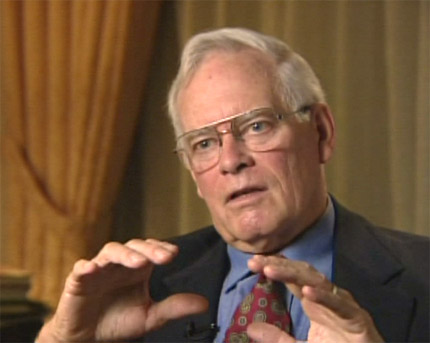 John Tanton, architect and engine of America's anti-immigration movement.
John Tanton, architect and engine of America's anti-immigration movement.
And, more often than you might think in this large country of wealthy interests, the drivers are plain folks - not billionaires, not corporations, just determined and single-minded individuals.
There's no denying the influence of money. But passion, obsession and relentlessness can make all the difference, especially when multiplied by patience.
The architect and engine of America's anti-immigration movement was a small-town ophthalmologist from Northern Michigan named John Tanton. Beginning about 40 years ago, Tanton founded and built a web of organizations that fought to sharply limit the number of new arrivals, both illegal and legal, to the United States.
At various times, his work was endorsed by prominent figures from both the right and the left; at other times, he was marginalized. But he kept at it, and by the time he died this last week, he was a looming figure in the politics of our times, having moved immigration to the head of the nation's political agenda.
That he missed by one day seeing the president of the United States basking in chants of "Send her back!" at a raucous rally was an almost biblical fate. He fell just short of his promised land.
No mass movement is ever built from a single mindset. Especially in a democracy, politics boils down to the art of coalition-building. It involves making people believe that the aim they share is more urgent than anything dividing them.
Though born in Detroit during its automotive heyday, Tanton grew up on a family farm in rural Michigan, developing a love of open spaces and small towns. These passions led him to wage his battles from remote Petoskey, Mich., where the population neither grows or shrinks by any appreciable degree, bouncing around between 5,000 and 6,500 in every census since 1920.
If you remember from grade school that the state of Michigan (minus its Upper Peninsula) rather resembles a mittened hand, you'll understand when I say that Petoskey is found at the tip of the middle finger, a long way from pretty much everywhere.
Given those core values, Tanton was a firm believer in the idea that continued growth of human population poses an existential threat. He became active in the Sierra Club and Planned Parenthood in the 1960s, and was taken by the neo-Malthusian work of Paul R. Ehrlich, whose best-selling polemic of 1968, "The Population Bomb," was written under the influence of Sierra Club swami David Brower.
From Ehrlich's book came the group Zero Population Growth, which promoted birth control as an environmental imperative. Tanton was an early and enthusiastic supporter.
At some point in the 1970s, though, Tanton shifted his focus from the immense problem of global population to the more localized issue of U.S. population. With the end of the baby boom, Americans were no longer multiplying. The nation's growth was coming from immigration, so that's where he set his sights.
Tanton founded the Federation for American Immigration Reform in 1979 to push for strict limits on the number of new arrivals. He soon added U.S. English to fight the spread of multilingualism in government and education.
In 1985 came a think tank - the Center for Immigration Studies - to crank out supportive studies. With the advent of the internet, he encouraged an acolyte, Roy Beck, to start NumbersUSA, which led the opposition that derailed the 2007 attempt at a bipartisan overhaul of the immigration laws.
When cultivating wealthy donors such as Cordelia Scaife May and maverick politicians such as former Colorado Gov. Richard Lamm, Tanton led with his environmentalism.
But in several private memos leaked in the 1980s, he prioritized the concerns of his white nationalist supporters.
"As Whites see their power and control over their lives declining, will they simply go quietly into the night? Or will there be an explosion?"he asked in one. "Why don't non-Hispanic Whites have a group identity, as do Blacks, Jews, Hispanics?"
President Donald Trump likes his politics at a constant boil, but now he's risking a blowup in the Tanton coalition. No-growth environmentalists continue to comprise a quiet regiment in the anti-immigration army, but they are unlikely to tolerate further courtship of white nationalists. Yet they'll have nowhere to go if Democrats embrace virtually open borders. The Trump resistance needs to make room for the environmentalists - and labor unionists - who believe the country has just about all the people it can handle.
Though immigration has always waxed and waned as an issue in American politics, it has never had more salience than today.
This is the legacy of John Tanton. Now will his tricky coalition survive the death of the coalition builder?
Every weekday JewishWorldReview.com publishes what many in the media and Washington consider "must-reading". Sign up for the daily JWR update. It's free. Just click here.
(COMMENT, BELOW)


 Contact The Editor
Contact The Editor
 Articles By This Author
Articles By This Author